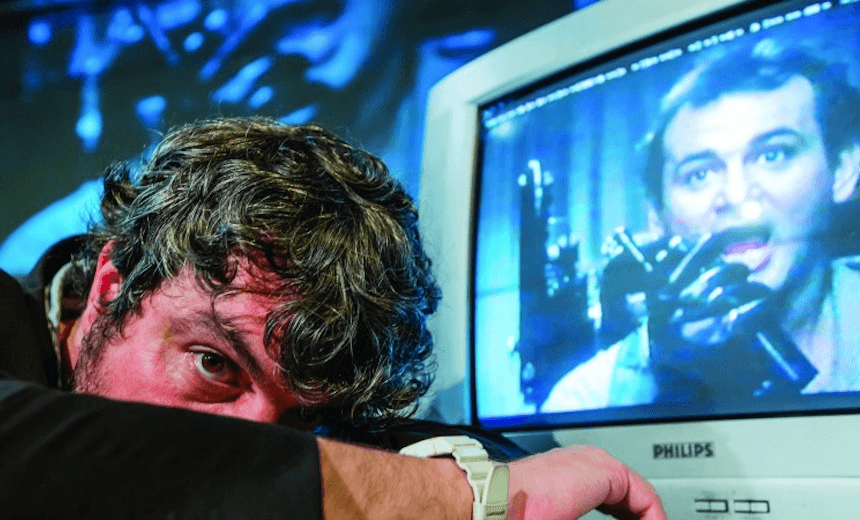Henry Oliver talks to Ross Sutherland, a British poet whose VHS performance piece Standby for Tape Back-Up, a multimedia meditation on memory, meaning and grief, is on in Auckland and Wellington this week.
A little over ten years ago, with a healthy dose of mid-00s meta-irony, a group of friends and I get stoned and watched The Wizard of Oz while playing The Dark Side of the Moon on repeat. After a couple of attempts at starting the album at the MGM lion’s third roar, we laugh as the two texts synchronise in ways that sometimes seem too good to be true: the word ‘balance’ matches up with Dorothy balancing on a fence; we hear the line “the lunatic is on the grass” as the Scarecrow begins his floppy dance by some bright green grass; the bass-drum heartbeats that close the album for the first time (you have to put it on repeat y’see) match Dorothy listening to Tin Man’s chest to confirm he has no heart.
About a year later, in another country, an elderly man who I’d never heard of until this week dies, setting off a chain of events that will bring British poet Ross Sutherland to New Zealand to perform his VHS performance poem/one-man-show Stand By for Tape Back-Up in Auckland’s Hollywood Cinema tonight and Wellington’s The Roxy on Tuesday.
That man was Sutherland’s grandfather, who, in 1984, took his four-year-old grandson to see Ghostbusters five days in a row. Over 30 years later, when Sutherland’s grandfather died, Sutherland was left a VHS tape, the very VHS tape he would use at his grandparents house when he stayed with them every summer, recording over what he’d recorded the summer before. The first movie he recorded off the TV was Ghostbusters, which was eventually partially taped over with The Fresh Prince of Bel-Air, Michael Jackson’s ‘Thriller’ video, British game shows and Jaws.
A few years later still, Sutherland found the tape in his loft and began watching it repeatedly. He was suffering from depression and asthma and found comfort in the tape. He’d watch it alone, watch it with friends, just put it on in the background at parties. He watched it hundreds of times and started to see it not just as a kind of self-portrait to ground himself during times of desperation – “It felt like a home movie, despite there not being a single image of me on it,” he says – but as a way to process the grief he still felt over the passing of his grandfather.
Sutherland is a poet who followed the practices of the Oulipo school, in which a writer arbitrarily restricts themselves to push their creativity beyond the cliches which all-too-easily spring-forth when a writer is faced with a blank page. He wrote poems where every word contained the same vowel. “The idea is that by choosing those forms, you’d end up writing from your subconscious,” he says. “All your conscious mind wants to write is cliche and you have to circumnavigate your own bourgeois mindset in order to get down to what’s going on in the back of your brain.”
So when he began to unpack and internalise the videotape – knowing it intimately, yet finding new intricacies every time he watched it – he began to see how he could not only be inspired by the tape, but start writing over it and synchronising his poetry to the images he was seeing on screen. He would write his own version of Dark Side of the Moon to perform over images of Will Smith, and Michael Jackson, and an ad for a bank, giving himself over to the synchronicity that he began to find in the tape. Sections are played and rewound and played again. Just as you have to play Dark Side of the Moon two-and-a-half times for it to soundtrack the entire Wizard of Oz, Sutherland plays bits of the tape on repeat, draining them of their original meanings and narratives by injecting his own.
So as much as Standby for Tape Back-Up is about Sutherland’s grief, it is also about how the we process the information of our lives. We remember our lives through repetition of memories. And whether that means watching an old video over-and-over or simply thinking about past events, each time we remember something we are dubbing over our previous memory with a newer version, and just like Sutherland’s VHS, as we rewrite our memories, even if they remain accurate – Will Smith is still missing that shot – they’re distorted slightly. They’re warped, they’re fuzzy, they’re imperfect.
But, because life is imperfect, we’re used to it. We fill in the gaps and see patterns where there are none. We see don’t see still 24 still frames, we see Dorothy skipping in a fluid motion. We don’t think about the millions of details in Dark Side of the Moon that don’t match-up with The Wizard of Oz, we latch onto the instances where, even vaguely and metaphorically, it does.
Standby For Tape Back-Up is on at Auckland’s Hollywood Cinema on 24 November and Wellington’s Roxy Cinema on 28 November 28. Buy tickets here.

